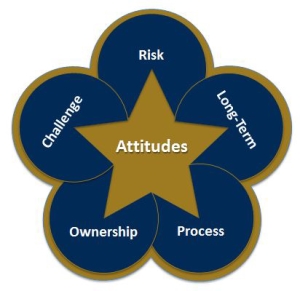 My Prime Performance System explores five important areas related to the psychology of sports: attitudes, obstacles, preparation, mental muscles, and tools. This article will introduce you to the first essential area—attitudes—and explain why they are so important to sports success.
My Prime Performance System explores five important areas related to the psychology of sports: attitudes, obstacles, preparation, mental muscles, and tools. This article will introduce you to the first essential area—attitudes—and explain why they are so important to sports success.
The dictionary definition of attitude is “The way you think and feel about something…a way of thinking and feeling that affect a person’s behavior.” You hold attitudes about your sport that have a direct impact on how you practice and how you perform. Moreover, you may not even be aware of some of these attitudes and, as a result, not be recognize how they affect you, whether positively or negatively.
Let me introduce you to the five attitudes that I believe most influence your sports efforts.
Ownership
Ownership involves the connection that you have with sports and why you participate. Do you ‘own’ your sports involvement? What this question gets at is whether you are taking control of everything that impacts your sport. You don’t want to leave anything that might affect your athletic performances to chance or to other people. Whether physical, technical, tactical, equipment, or mental, you will only achieve your sports goals if you take full responsibility for every aspect of your sport.
Process
We live in a world where results matter. You don’t get ahead because you’re a nice person or because you try hard (though effort is usually related to results). You progress because you get results. But contrary to popular belief, focusing on results actually prevents you from getting the results you want for two reasons. First, if you’re focusing on results (which occur at the conclusion of a competition, you’re not focusing on what you need to do to get those results, namely, what you need to do to perform your best from the start to the finish. My basic belief is: “Results matter, but to get them, ignore them.” The bottom line is that if you focus on the process, there’s a better chance that the results will come.
Challenge
I often see athletes responding to competitions or difficult conditions as a threat. This threat reaction causes doubt, worry, and tension, resulting in tentative and cautious performances. In a way, perceiving a competition as a threat causes your inborn fight-or-flight response to be triggered and, most often, flight is the option that is chosen. When I say flight, I don’t mean running away from the field, course, court, or wherever you are performing, but rather playing in protective mode, safe and within your comfort zone.
To perform your best and attain your goals, you must see every aspect of your sport as a challenge to pursue, not a threat to avoid. This challenge reaction creates confidence, determination, intensity, and excitement, resulting in aggressive and intense performances. Your fight-or-flight response may still be triggered, but, when you feel challenged, you choose to fight, not flee.
Long-Term
We live in a culture that is accustomed to getting everything fast and without much effort (think microwaves, instant messages, and Internet searches). We also live in a culture where, as I indicated above, results seems to matter NOW. As a result, it’s easy to believe that you need results right away or you won’t achieve your sports goals. It’s also easy to become impatient and frustrated when you don’t get those results right away, particularly when you see your competitors getting the results that you want.
But the reality is that results don’t come quickly or easily or necessarily when you want them to. Having a short-term attitude about results only places expectations and pressure on you that actually slow your progress.
For you to have your best chance of achieving your sports goals, you must adopt a long-term attitude toward your development. With this attitude, you will be patient, allow yourself to develop at your own pace, and you will actually perform better now because you’re not stressed out about results, thus better positioning you to get the results you want when they really matter at some point in the future.
Risk
Sports are inherently risky because there are dangers in giving your best effort and pushing your limits. Your opponents and, depending on your sport, external conditions (e.g., weather, field conditions) attempt to strike fear in you and prevent you from performing your best. Yes, the risks can be about physical injury, but, more often, it is about failing to achieve your sports goals. This aversion to risk results in performances that may be technically and tactically sound, but that are also safe and, even worse, not up to your capabilities.
The reality is that risk is essential to performing your best and finding success. If you aren’t taking risks, you aren’t performing the best you can. Taking risks can mean going for a tough shot in golf, trying to serve an ace in tennis, or running a little faster than you might think you can in a running race (what are ways you can risk in your sport?). It is these risks that enable you to create small, yet consequential, advantages over your competitors and ensure that you do everything you can to succeed. And it is these risks that enable you to fully realize your ability and accomplish your sports goals.
I will introduce the next four essential mental areas of my Prime Performance System in upcoming articles.
Do you want to learn more about how my Prime Performance System can help you or your young athletes achieve their sports goals? Get your FREE Prime Sport: Psychology of Champion Athletes e-book.




